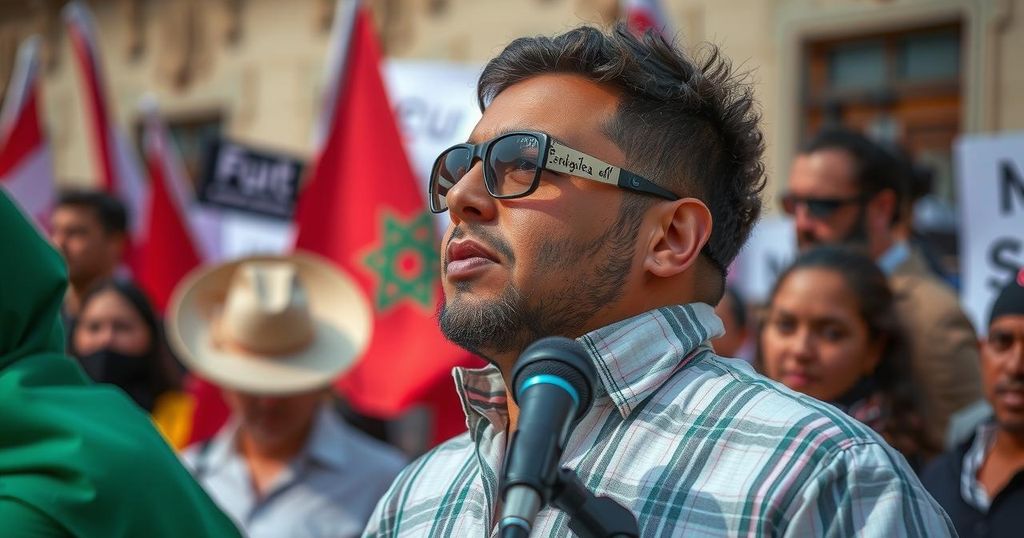Moroccan Activist Sentenced for Protests Against Government’s Earthquake Response

Said Ait Mahdi, a Moroccan activist critical of the government’s earthquake response, received a three-month prison sentence, prompting claims of politically motivated repression. The September 2023 earthquake caused significant destruction, and ongoing protests demand accountability for recovery efforts amid accusations of government mismanagement. Ait Mahdi’s case reflects broader issues of civil liberties in Morocco, drawing condemnation from human rights advocates.
In Morocco, prominent activist Said Ait Mahdi has been sentenced to three months in prison for his role in protests criticizing the government’s response to the devastating 2023 earthquake. During the protest, Ait Mahdi aimed to highlight the government’s alleged mismanagement of recovery efforts that left many victims in temporary shelters. His sentence has drawn widespread condemnation as politically motivated and arbitrary, with human rights organizations advocating for his immediate release. The earthquake caused catastrophic damage, claiming nearly 3,000 lives and leaving over 60,000 homes in ruins, further exacerbating existing regional inequities.
The earthquake, which registered a magnitude of 6.8, struck the Al Haouz region in September 2023, leading to extensive destruction and loss of life. Said Ait Mahdi, now sentenced for defamation, assault, and inciting unauthorized demonstrations, is the first activist from the affected region to receive a prison sentence post-quake. Protests continue to erupt as communities demand accountable disaster relief efforts. The Moroccan government has committed over $11.5 billion towards recovery, but many feel this is not sufficient to address the urgent needs of affected individuals, who still await adequate housing solutions.
Ait Mahdi’s case has drawn the attention of various civil liberties advocates and organizations, including the Moroccan Association for Human Rights, which condemned his arrest as a repressive measure against his activism. Recent protests have emerged not only in the rural areas near the epicenter of the quake but also in major cities like Rabat, where activists urged the government to expedite reconstruction efforts. His legal representation indicated that while the sentence was shorter than expected, similar cases typically result in longer prison terms, raising further concerns over justice and political repression in Morocco.
Furthermore, the Local Coordination for the Defense of Freedoms and the Right to Organize has called the charges against Ait Mahdi efforts to obscure serious governmental failings in responding to the earthquake’s aftermath. Following his conviction, supporters gathered outside the court to protest, holding his portrait and demanding justice for the earthquake victims.
The aftermath of the September 2023 earthquake in Morocco’s Al Haouz region has prompted widespread criticism of governmental disaster management practices. As communities struggle to recover, calls for accountability and improved infrastructure have intensified, particularly among marginalized indigenous groups impacted by the disaster. Ait Mahdi’s activism reflects the frustrations of these communities, particularly regarding the slow pace of reconstruction efforts and the transparency of government actions. This situation has revealed deeper social inequities, making activists like Ait Mahdi pivotal voices in demanding change.
The sentencing of Said Ait Mahdi underscores ongoing tensions in Morocco surrounding civil liberties and governmental accountability in disaster response. As recovery efforts for the earthquake continue, the activism surrounding Ait Mahdi’s case highlights a growing movement calling for justice and improvement in infrastructure for affected communities. It raises questions about freedom of expression and the rights of individuals to advocate for their communities, emphasizing the ongoing struggle for civil rights within the region. The international community and human rights organizations are likely to pay close attention to how these dynamics evolve in the face of political pushback.
Original Source: www.newsday.com






